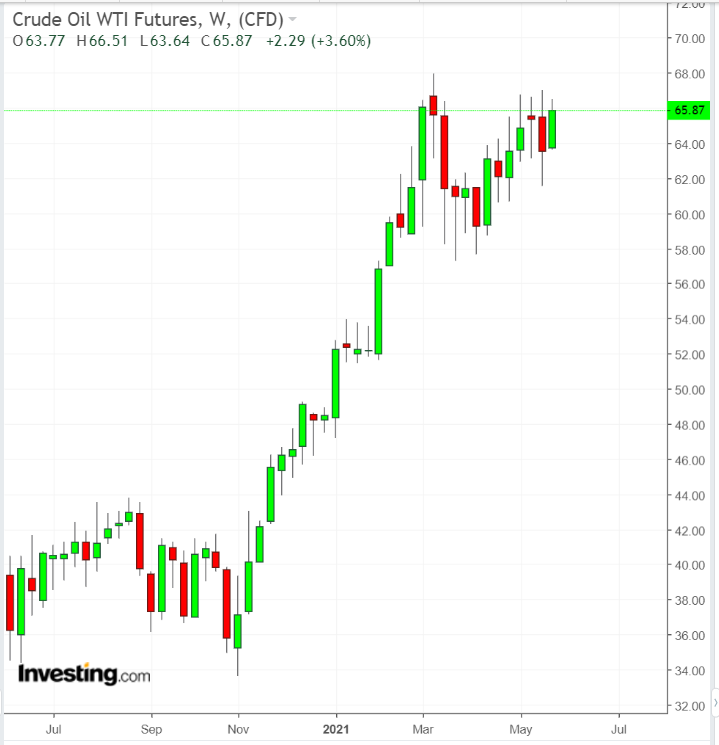The upcoming OPEC+ meeting, planned for June 1 via videoconference, will most probably have as a top item on the agenda, the group’s current production agreement, which runs through the end of July.
The agreement has seen compliance and market monitoring issues of late, so while the supply and demand picture is certainly a major topic gaining momentum, it'll most likely be overshadowed by the prospect of Iranian oil returning to the market.
Below, we discuss 3 important topics for the conference.
1. OPEC+ Supply Status
The OPEC+ Joint Technical Committee (JTC) and Joint Ministerial Monitoring Committee (JMMC) will meet on May 31 and discuss the official supply numbers before the full ministerial meeting on June 1. Based on the numbers for March, Russia and Iraq have been overproducing their quotas.
According to S&P Platts, OPEC+ countries breached their quotas by a total 3.316 million bpd in March. Russia leapfrogged its quota by the largest margin—877,000 bpd. Iraq disregarded its levels by 707,000 bpd and South Sudan and Kazakhstan were also significant participants in the quota overflow scene.
Russia and Kazakhstan did receive permission to increase April’s, but countries that have overproduced their quotas are expected to submit plans that detail how they will compensate for their overage between now and September.
Saudi Arabia is likely to hold some of these countries to that commitment—especially Iraq. It is likely that Russia will not be pressed on the issue.
2. Will OPEC+ Increase Production?
According to the current agreement, OPEC+ plans to gradually increase production by 1.2 million bpd between May and July, so the group will assess progress towards that goal at next week’s conference.
Because the group has been meeting monthly lately, it is possible that they will decide to alter the current agreement.
Given current trends in oil prices and global demand, it is unlikely that OPEC+ will see a reason to cut production. Rather, it is possible they will consider increasing production instead.
Alexander Novak, Russian Deputy Prime Minister and Russia’s representative at OPEC+ said yesterday that the global oil market is currently in a deficit of “around 1 million bpd.”
This is a signal that he will probably push for OPEC+ to increase production, certainly in July, but possibly in June as well.
OPEC+ also looks at the amount of oil that consuming countries have in storage (or inventory) to determine whether a production increase is warranted.
This is a primary reason why OPEC+ did not increase production earlier this year, even when oil prices seemed to be rising quickly. At the time, consuming countries like India pressed Saudi Arabia to put more oil on the market, but OPEC+ refused.
Instead, Saudi Arabia’s oil minister mockingly told India that it should consume its stored oil which it purchased rather cheaply from Saudi Arabia in 2020.
To this point, U.S. petroleum inventories (which include crude oil and refined products) are now back to the levels last seen at the end of March 2020.
This is an indication that the oil surplus caused by the coronavirus pandemic is almost gone—at least in the United States. The question is whether OPEC+ wants to see global inventory levels lower.
If so, OPEC+ probably won’t increase production in June. However, OPEC+ must also worry that U.S. oil production could possibly pick up this summer to supply consumers hungry for cheaper gasoline. If that worry takes precedence, OPEC+ might need to increase production in June.
3. Handling Iran: Sooner Better Than Later
Talks are ongoing between U.S. and Iranian officials and there has been no commitment yet from the U.S. about ending sanctions on Iranian oil or returning to the JCPOA (Iran nuclear deal).
However, Iran is already preparing for the sanctions to end by readying its oil fields to increase production and reaching out to former customers to restart oil sales.
Iran has been gradually increasing its furtive oil sales over the past 6 months, but it still plans to double production when sanctions are lifted.
Some analysts believe Iran would be able to increase its production to 4 million bpd in 3 to 6 months. Other analysts believe it would take 12 to 15 months, because it can take as long as a month to remove obstacles like blocked bore-hole pumps in oil fields.
Still, Iran has 60 million barrels of stockpiled crude oil that it can put on the market when sanctions are lifted—if it has the customers lined up.
India has already indicated that it plans to resume purchasing Iranian oil once sanctions are lifted. China has been purchasing Iranian oil all along through intermediaries which disguise its origin. China will likely increase its purchases when sanctions are lifted.
The question OPEC+ must consider now is how to incorporate Iran into OPEC+’s existing production agreement. In the past, OPEC has allowed a grace period to Iran and other countries that experienced interruptions in oil production for war or sanctions.
However, the negotiations over such a production and sales grace period can be contentious and acrimonious. Remember, from a geopolitical perspective, Iran is still an enemy of Saudi Arabia.
It is possible that OPEC+ might push off discussions with Iran until July, though the group is likely to start considering the impact of Iranian oil on its supply and demand scenarios at the conference next week.
Alexander Novak has indicated that he believes OPEC+ needs to deal with the Iran issue sooner rather than later, and that OPEC+ needs to take into consideration Iran’s “actual production levels.”
Traders should look for OPEC+ to start assessing how an increase in Iranian oil production would impact the market at the June 1 meeting, even if the oil ministers don’t talk about it publicly.
